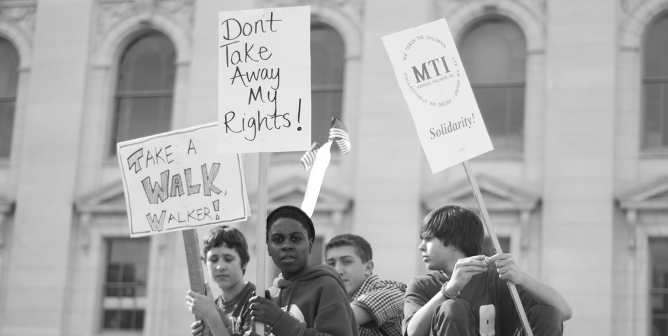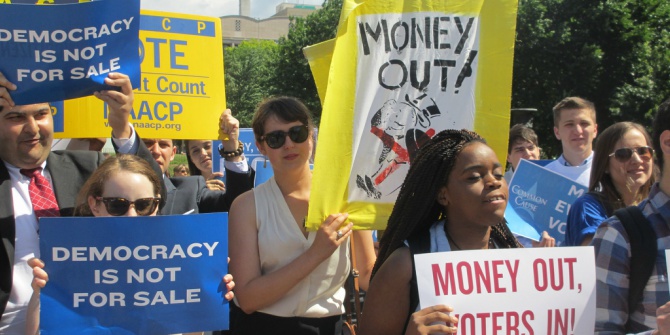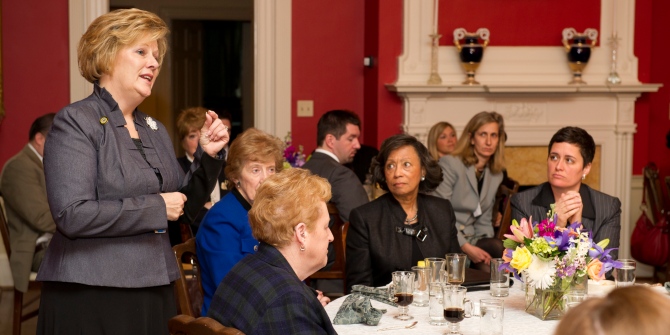 Next week sees Seattle residents go to the polls to elect a new mayor and City Councillors. Tory Mallett writes that what makes this election worth watching is that in Seattle, voters are able to ‘spend’ up to $100 on contributions to candidates’ campaigns via a property-tax funded voucher scheme. While the system may appear to enhance democracy by getting ‘big money’ out of local politics, she argues that it may also disincentivise candidates from making close links to unions and activist groups, and lock voters in to supporting one candidate from an early stage.
Next week sees Seattle residents go to the polls to elect a new mayor and City Councillors. Tory Mallett writes that what makes this election worth watching is that in Seattle, voters are able to ‘spend’ up to $100 on contributions to candidates’ campaigns via a property-tax funded voucher scheme. While the system may appear to enhance democracy by getting ‘big money’ out of local politics, she argues that it may also disincentivise candidates from making close links to unions and activist groups, and lock voters in to supporting one candidate from an early stage.
Seattle’s municipal general elections will take place on 7th November. There are four seats up for grabs: Mayor, City Council District Position 8, Positon 9, and City Attorney. You’d be forgiven though for only knowing about the mayoral race. After all, it’s the highest position, but it’s also been the focus of major news over the last six months.
A week before the filing deadline for the primary, Mayor Ed Murray announced that he would not seek re-election amid several accusations of inappropriate sexual relationships with vulnerable young men and boys in his past. This led to a rush on the once-assumed-safe mayoral seat. Ultimately, 21 people filed for the office. The two victors out of the non-partisan primary represent two familiar archetypal political roles: the outsider populist and the experienced establishment candidate. It’s a fascinating and exciting race that brings into focus the narrative of the America’s political moment.
But it’s just that, momentary.
The truly interesting event is happening down-ballot, where five of the six general election candidates are publicly funded through a new system called Democracy Vouchers.
In 2015, Seattle voters approved the system in which each resident receives four $25 Vouchers to distribute to participating candidates of their choosing. The Vouchers are funded through a property tax levy. To become a participating candidate, each campaign had to gather 400 signatures along with a minimum cash contribution of $10 each. They also agreed to an outside contribution limit of $250 (non-participants can take up to $500) and a spending limit of $150,000 per race, so $300,000 per cycle. However, they can appeal to be released from this limit with adequate reason like a nonparticipating opponent raises more than the $150,000 limit. Table 1 shows the results of the Voucher program as of October 24th:
Table 1 – Results of Seattle election Voucher program
| Candidate | Position | Vouchers | Total |
| *Jon Grant | City Council Position 8 | 12,000 | $300,000 |
| *Teresa Mosqueda | City Council Position 8 | 12,000 | $300,000 |
| Lorena Gonzalez | City Council Position 9 | 7,724 | $193,100 |
| Pat Murakami | City Council Position 9 | 4,170 | $104,250 |
| Pete Holmes | City Attorney | 3,240 | $81,000 |
*Candidate has reached the Democracy Voucher spending limit and may no longer receive program funds. Source
The idea behind the programme is that candidates will be forced to interact with potential contributors outside of the traditional donor class in Seattle. It also allows residents an additional mechanism for participating in the election process. However, by setting the limits to what can be raised by the Vouchers, the programme threatens to stop traditional interest groups from being big players in the elections. This may sound like getting “big money out of politics,” and it’s certainly intended to work this way, but the reality is more complicated than that.
Let’s take a step back to 2010 to the landmark Supreme Court decision Citizens United v. Federal Election Commission. The case established that the government cannot interfere with contributions to and spending by Political Action Committees as long as they do not coordinate directly with campaigns. This effectively allows “dark money”, or money that is relatively anonymous and unaccountable, to influence American elections through independent expenditures. Leftists in the US are frustrated by the law because it allows corporations to spend freely, and those on the right believe that it allows unions too much power.
In Washington State, however, all independent expenditures must be reported, and under the new law, they count toward the spending limits. The results of this could be massive for Seattle representation.
Firstly, candidates who have spent their time developing relationships with organisations like workers’ unions and activist groups will no longer be able to capitalise on those relationships. This disincentivises people seeking office from building those relationships in the first place as the clout they once offered loyal candidates falls. This could extend further to damaging the reputation of these groups among their members since they will no longer hold sway in policy making bodies to the same degree. Instead, fundraising becomes hyper individualised and the power of representative groups diminishes.
Secondly, candidates with one-on-one charismatic appeal will benefit greatly, especially those with the leisure time to go door-to-door collecting vouchers. This raises the question of representation and what we really mean when we talk about the people’s interests. We tend to think that people like us will do a better job of representing us, but the reality is that most people trust someone who came to their door and talked about the issues that matter to them more than someone who matches up with them on paper. Under this new system, who will win out?

Photo credit: Author
Thirdly, if money is speech, as it is defined in the American election process, then by giving a voucher to a candidate, a resident is making a statement. But they are doing so during the deliberation process of a campaign rather than at the end of it. It’s an odd thing that sets up something of a pre-vote vote for the residents. Political science tells us that people tend to defend their votes and remain committed to their candidates after the election. Will they feel the same way about Voucher recipients? What does that mean for the campaign process itself?
It’s a fascinating experiment in democracy, and it has the potential to create a whole new system of empowerment for residents of Seattle. Activists saw a problem in the federal system and they worked to build a stop-gap against unwanted influence in their city. But we shouldn’t overlook the real systemic shifts in power it can bring and the impact it could have on how we think about representation and speech in the future.
Seattleites have their mail-in ballots and are filling out their choices now. They’ve received dozens of pieces of mail, been inundated by TV commercials, and have probably seen more lawn signs than anyone could ever count. For most, this probably feels just like another normal election. But on November 7th something very abnormal will happen: there will be at least two citywide elected officials who relied on Democracy Vouchers for funding their campaigns, and the consequences could be momentous.
Please read our comments policy before commenting.
Note: This article gives the views of the author, and not the position of USAPP– American Politics and Policy, nor of the London School of Economics.
Shortened URL for this post: http://bit.ly/2zUDVtc
_________________________________
About the author
 Tory Mallett – LSE Sociology
Tory Mallett – LSE Sociology
Tory Mallett is a PhD student in LSE’s Department of Sociology. Her research looks at the logics of coalescence and coordination by high policy demanding individuals in local American elections during invisible primaries. Tory has worked for several years in political campaigns throughout the United States before attending LSE.







Special interests control our American elected officials in all levels of government. The most impactful level, of course is our Federal level. From public safety, to tax law and our own public health, lobbyists control the votes on legislation that they often create themselves. This conflict results in the laws we live under and the desires of the American public.
It is a point of concern to me that the Seattle Approach to Public Funding has not reached the mainstream US media but is being highlighted by our friends in the U.K. Cheers to you for your efforts. They are greatly appreciated.
There are two ebooks that I have read that have illuminated the very issue that Seattle is trying to eliminate, both by the same author, Wendell Potter. The first book was, A Notion on the Take and the second, Deadly Spin. The first reading describes in detail how our Federal officials have been controlled by their need to raise obscene sums for their reelection and the second book focused on the antics of the health care industry while the Affordable Health Care Act was being crafted. Unsurprisingly, neither shed honor upon our legislative bodies.
Thank you for placing this blog on twitter and bringing light to this critical issue.